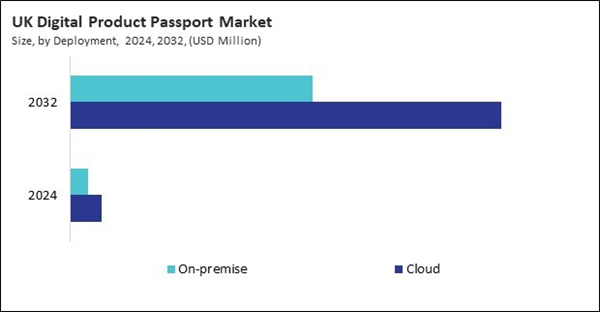The Germany market dominated the Europe Digital Product Passport Market by country in 2024, and is expected to continue to be a dominant market till 2032; thereby, achieving a market value of $266.6 million by 2032. The UK market is exhibiting a CAGR of 39.6% during 2025-2032. Additionally, the France market is expected to experience a of 42.2% during 2025-2032.
The rise of DPPs marks a pivotal shift in how industries approach product transparency and sustainability. Unlike traditional product labeling, which often provides limited or static information, DPPs offer a dynamic, digital repository of data accessible via technologies like QR codes, NFC tags, or blockchain-based platforms. This allows stakeholders - manufacturers, retailers, consumers, and regulators - to access real-time, verifiable information about a product’s lifecycle.
The European Union (EU) has been a trailblazer in this space, with regulations such as the Ecodesign for Sustainable Products Regulation (ESPR) mandating DPPs for all products sold in the EU by 2026, a move that underscores the region’s commitment to sustainability and circular economy principles. Beyond Europe, regions like North America, Asia-Pacific, and Latin America are also embracing DPPs, driven by the need to align with global standards and meet consumer expectations for eco-conscious products.
The market in Europe is experiencing dynamic growth, spurred by the continent’s strong regulatory drive and environmental commitments. Germany's pharmaceutical industry has seen notable growth, presenting valuable opportunities for the adoption of Digital Product Passports (DPPs). In this highly regulated sector, the need for precise tracking of raw materials, production batches, and distribution channels is essential to ensure product safety, efficacy, and regulatory compliance. In the United Kingdom, the food and beverage manufacturing sector - particularly beverages and a broad range of other food products - plays a significant role in driving the adoption of Digital Product Passports (DPPs). n Italy, the automotive sector holds significant economic importance, playing a key role in the country’s manufacturing and overall economic landscape. This industry is increasingly facing regulatory demands to enhance sustainability, address supply chain challenges, and promote circular economy practices such as vehicle recycling and battery lifecycle management. In conclusion, the growth of Germany’s pharmaceutical industry, the UK’s food and beverage manufacturing, and Italy’s automotive sector each serve as powerful catalysts for the expansion of the market.
List of Key Companies Profiled
- Avery Dennison Corporation
- Siemens AG
- BILLON GROUP LIMITED
- ARIANEE
- iPoint-systems GmbH
- Kezzler AS
- Optel Group
- Persequor ApS
- Sigma Technology AB (Danir AB)
- LyondellBasell Industries Holdings B.V.
Market Report Segmentation
By Deployment
- Cloud
- On-premise
By Offering
- Software
- Services
By Industry
- Consumer Electronics
- Textile & Apparel
- Automotive
- Pharmaceuticals
- Food & Beverages
- Chemicals & Industrial Products
- Construction & Building Materials
- Other Industry
By Country
- Germany
- UK
- France
- Russia
- Spain
- Italy
- Rest of Europe
Table of Contents
Companies Mentioned
- Avery Dennison Corporation
- Siemens AG
- BILLON GROUP LIMITED
- ARIANEE
- iPoint-systems GmbH
- Kezzler AS
- Optel Group
- Persequor ApS
- Sigma Technology AB (Danir AB)
- LyondellBasell Industries Holdings B.V.









